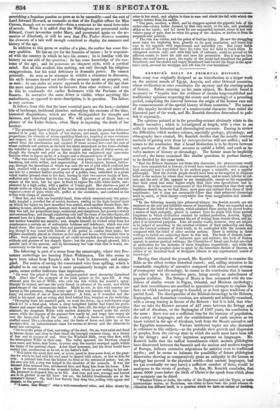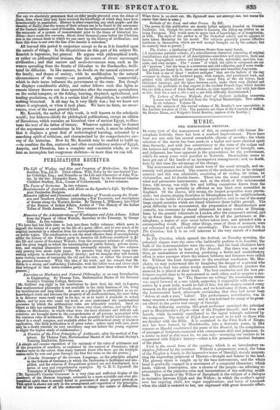%ENRICH'S ESSAY ON PRIMEVAL HISTORY.
THIS essay was originally designed as an introduction to a larger work on the ancient annals of Egypt, Assyria, and other Oriental countries,
whose civilization at once constitutes the mystery and the starting-point of history. Before entering on his main subject, Mr. Kenrick found it necessary to "inquire into the evidence of certain long-established and traditionary opinions respecting the events and chronology of a preceding period, comprising the interval between the origin of the human race and the commencement of the special history of those countries." The nature of this inquiry involved more of a controversial character than suited the historical part of the work, and Mr. Kenrick therefore determined to pub- lish it separately.
The opinions pointed at in the preceding extract obviously relate to the Mosaic narrative ; which is investigated at length, with a view to set aside its merely historical and chronological accounts. Passing in review the difficulties which modern science, especially geology, physiology, and ethnography have created, Mr. Kenrick decides that the usually received methods of getting over them by interpretation will not suffice; and he
comes to the conclusion that a broad distinction is to be drawn between such portions of the Mosaic account as unfold a belief, and such as in-
volve matters of history or chronology. The former must be implicitly received ; the latter examined like similar questions in profane history, to be decided by the same tests.
" Had the Hebrew literature not borne this character, the phzenornenon would have been unparalleled in history; it would have wanted a most decisive stamp of high antiquity had it exhibited in its earliest pages a scientific, not a popular
philosophy. That the Jewish people should have been so far superior in religions belief to the nations by whom they were surrounded, and so much inferior in cul-
ture and the arts of life, appears to me inexplicable, except on the supposition
that their creed had some higher origin than their own speculations and in- ferences. It is the natural consequence of this Divine instruction that their early traditions should be, as we find them, more pure and rational than those of their neighbours; but it does not necessarily follow that their primaeval chronology must be exact, or their history everywhere free from exaggeration and miscon- ception."
"In the following inquiry into primeval history, the Jewish records are not assumed as the sole and infallible source of knowledge. They are regarded as an evidence of the belief of the nation, which admitted them among its sacred books; a nation of high antiquity, placed in contact from its origin with those ancient kingdoms in which civilization reached its earliest perfection, Assyria, Egypt, Phomicia ; a nation which possessed the art of writing from remote times, and ap- plied it to historical purposes. Like all similar works, however, they are subject to be judged of according to the external evidence of their authorship and date, and the internal evidence of their truth, to be confronted with the records and compared with the belief of other ancient nations. There is nothing in these writings to forbid our subjecting them to this test. The book of Genesis incor prorates written documents of unknown ages and authors; the book of Joshua appeals to ancient poetical writings; the Chronicles of Israel and Judah are cited as authorities for the histories of these kingdoms respectively; and while the legislator and the prophet claim to speak by the immediate dictate of Heaven, no author of an historical book of Scripture alludes to any supernatural source of knowledge."
Having thus cleared the ground, Mr. Kenrick proceeds to examine the Bible as the oldest written historical record ; and, calling attention to its
remarkable simplicity of narrative compared with other ancient systems of cosmogony and chronology, he comes to the conclusion that it cannot be relied upon in its narrative parts, being merely an embodiment of popular tradition. The Deluge of Moses is then compared with the tra- ditions of similar events in Pagan, Oriental, and Mexican mythology; and their resemblances are ascribed to speculative attempts to explain the facts on which modern geology is founded, or at best upon traditions of a partial flood. The discrepancies of the Biblical chronology in the Hebrew Septuagint, and Samaritan versions, are minutely and critically examined, with a strong leaning in favour of the Hebrew : but it is held, that whe• ther we take the Hebrew account of 427 years between the Deluge and the call of Abraham, or the Septuagint of 1207 years, the conclusion is the same : there was not a sufficient time for the increase of population, the variety of languages, and the establishment of such empires as we know existed in the age of Abraham, both from the Mosaic narrative and the Egyptian monuments. Various incidental topics are also discussed in reference to this subject,—as the probable slow growth and dispersion of peoples, from the cut-up state in which the earth must have been left by the deluge ; and a very ingenious argument on languages. Mr. Kenrick holds that the radical resemblances which modern philologists have discdvered between the Sanscrit and the ancient and modern tongues of Europe, indicate extensive migrations far anterior even to traditional myths ; and he seems to intimate the possibility of future philological discoveries showing as comparatively great an antiquity in the human as geology has proved in the physical world—that ancient languages, had we (as eventually we may have) a sufficient number of facts, would be analogous to the strata of geology. In fine, Mr. Kenrick concludes, that about 3000 years before the birth of Christ is the epoch from which alone any certainty can be dated.
" Whether China or India, the valley of the Euphrates and the Tigris, or some intermediate region, as Bactriana, can claim to have been the point whence ci- vilization has diffused itself, is a question which we have no means of deciding. Nor can we absolutely pronounce that no elder people preceded even the eldest of these, from whom they may have received the knowledge of which they have been immemorially in possession. History is silent respecting any such people: and the theories of Bailly, that the traces of their science are to be found in the astronomy of the Eastern nations—and of Gosselin, that the earliest measures of the earth are the remnants of a system of measurement prior to the times of historical tra- dition—have made few converts. About three thousand years before the Christian era is the utmost limit to which we can carry tip the history of civilization; and from this time to our own the line ofits descent is unbroken.
All beyond this period is conjecture except so far as it is founded upon the nature of things. In his disquisitions on this part of his subject Mr. Kenrick is ingenious, but general. He argues with philosophical truth, or rather on philosophical truisms, that the course of rivers encouraged civilization ; and that narrow and medi-terranean seas, such as the waters spreading from the Straits of Gibraltar to the Dardanelles, facili- tated its diffusion. In like manner, he dwells on the natural existence of the family, and thence of society, with its modification by the natural circumstances of the country—as pastoral, agricultural, commercial ; which in their turns influence the government or the state. But though he displays considerable ability, and rather follows such dim lights as remote history throws out than speculates after the common speculations on the social compact, or the fishing, hunting, shepherd, agricultural, and trading gradations, so rife in a certain kind of disquisition, he establishes nothing historical. It all may- be, it very likely was ; but we know not where it originated, or when it took place. We have no facts, no occur- rences, even of the most general kind.
Mr. Kenrick, the author of this work, is well known to the scholastic world; but hitherto chiefly for philological publications, except an edition of Herodotns, which contains an historical view of ancient Egypt, to illus- trate the text of the father of history. Whatever opinion may be formed of the arguments or conclusions in his present work, it must be admitted that it displays a great deal of archaeological learning, animated by a searching spirit of criticism, and characterized by the comprehensive sur- vey of the historian. How far Mr. Kenrick may be enabled to build up —to combine the dim, scattered, and often contradictory notices of Egypt, Assyria, and Phoenicia, into a complete and consistent whole, or even into an incomplete but congruous skeleton—is more than we can tell.



























 Previous page
Previous page